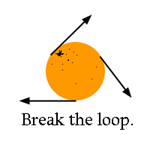

 | Tangentium |
All material on this site remains © the original authors: please see our submission guidelines for more information. If no author is shown material is © Drew Whitworth. For any reproduction beyond fair dealing, permission must be sought: e-mail drew@comp.leeds.ac.uk. ISSN number: 1746-4757 |
tangent [tan'jent]A straight line drawn from the circumference of a circle. To go off at a tangent: to take a new direction, to make a radical break from accepted practice, to explore new possibilities. Tangentium [tan-jent'i-um]An online journal of alternative perspectives into information technology and the politics of the "information society", compiled and edited at the University of Leeds, UK.
Introduction"Not another journal!": no, we don't believe it is "just another journal". Many online journals exist merely to save on printing and distribution costs; they do not use the medium of the Web. Their essays could equally well exist offline and once the texts are published they remain unchanged. Tangentium is not like that. Its texts will evolve, as new themes are explored each month: new hyperlinks will come into existence within archived texts, new connections will be made. We also solicit suggestions from the readership. If you have a useful, relevant hyperlink (whether to a different text on this site, or a different site altogether) that you'd like to see added to an archived text, then submit your suggestion for consideration. The same applies if you have a more substantial contribution to make: perhaps a new entry in the glossary, or a full essay for consideration. What's the site about?Broadly, Tangentium discusses the place of information technology (IT) in contemporary society. How do computers influence the way we work, teach, learn, communicate, act politically, think; in other words, live? However, it is not our intention to discuss these matters in traditional ways. Too often such questions are raised with the following underlying and often unstated assumptions:
Tangentium tries to take none of these things for granted. We seek to discuss IT with a critical, political eye. We are not technophobes: far from it. Our intention to use the WWW in the most constructive, Web-literate way we can should serve as evidence (if not proof) of that. But we are aware of some of the great problems which can arise from taking the abovementioned as read. We also base our discussions, wherever possible, on less orthodox political perspectives. Our favoured viewpoint is a general scepticism towards the political and corporate institutions which currently dominate society. This philosophy informs our feature essays and the subsidiary information used to elaborate upon them. Having said that, we welcome contributions from any political perspective; if and when contributions are published from different political stances we will make this clear. The best way to work out our point of view on IT and life generally is to start reading. But before you do so you might like to look at the notes below on the structure of the site. Site structureTangentium is updated every two months. Each issue is based around a specific theme. Forthcoming themes are advertised on the front page, and we welcome contributions for consideration. Each issue is built around a feature essay which is normally between 3,000 and 4,000 words long (though we will consider longer contributions). These essays are written to high academic standards, but it is also our intention to make them accessible to general audiences. That is not the whole of it, however. Each month we will also provide one or more subsidiary essays on the same, or related, themes. Sometimes these will supply background information; sometimes, opposing perspectives; sometimes, critical commentary on the feature essay. In addition, each month, we will define key terms (and these monthly glossaries will build up over time into a wide-ranging, interactive resource): and also supply a page of short snippets; interesting quotes, observations, events and so on relevant to the subject. Finally, each month we will provide a list of annotated resources. We will review a range of web sites and printed resources connected to the main topic. Our aim here is to stress quality over quantity - too many sites simply present long lists of hyperlinks which do nothing to address information overload. We will select, review and annotate whenever possible. Once again, we solicit suggestions and contributions from our readership in this area. Please note that all external links from this site will open in a second browser window. In that way they can themselves act as commentaries and observations on the text of this site. They will always open in the same browser window; you should never have to face more than two open windows at any time while browsing this site. Administrative informationTangentium is published by the School of Computing at the University of Leeds, UK.  Please send all enquiries to the Editor: Drew Whitworth, School of Computing, University of Leeds, Leeds LS2 9JT, UK. Tel: (+44) 113 343 5450. We have attempted to make this site as accessible as possible to all web browsers, including those used by people with disabilities. If you have any difficulties at all accessing any part of this site please inform us of your problem. | |